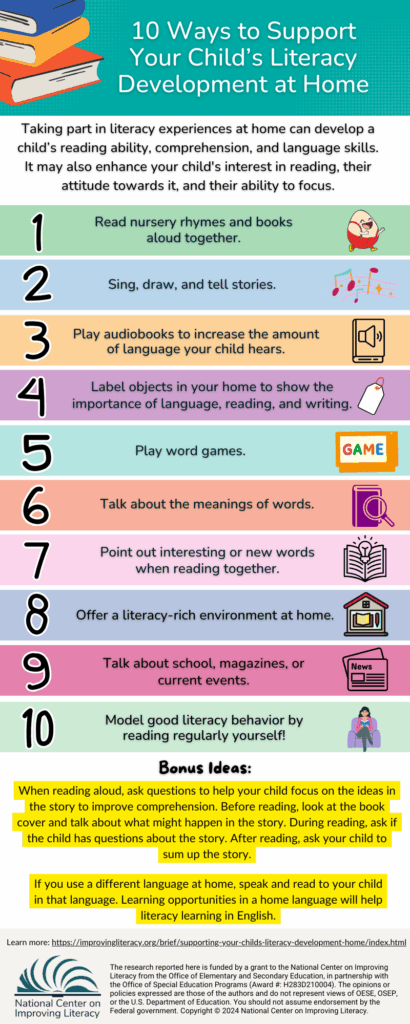Activities families can do at home to foster early literacy development include joint reading, drawing, singing, storytelling, reciting, game playing, and rhyming. When joint reading, you and your child take turns reading parts of a book. When reading, ask your child to connect to the story. Have them tell you more about what they are thinking. You can use their interests to choose books. Give positive feedback and ask open-ended questions during joint reading to boost interest and critical thinking skills.
For young children, nursery rhymes are especially helpful for language and early literacy development. Play audiobooks or read aloud at home to increase the amount of language your child hears. Hang different kinds of print around your house. Label objects in your home. This can show the importance of language, reading, and writing. Help your child build background knowledge on a topic. Talk about everyday experiences, show your child pictures, and tell stories.
If you use a different language at home, speak and read to your child in that language. This can help grow his vocabulary and make connections at school. It can also increase his curiosity and readiness to learn at school. Learning opportunities in a home language will help literacy learning in English.
For older children, play word games, talk about word meanings, and point out interesting or new words when reading together. Ask questions before, during, and after reading aloud. This can help your child focus attention on the ideas in the story. Before reading, look at the book cover and talk about what might happen in the story. During reading, ask what questions he has about the story. After reading, talk about what happened. Ask your child to sum it up and relate the story to what he already knows or has experienced.
For adolescents, engage in conversations, offer a literacy-rich environment, and be a strong model for reading. Talk about school, magazines, or current events. Ask them what they are reading and discuss the books. Have a lot of age-appropriate and grade-level reading material around your home. Model good literacy behavior by reading regularly yourself.
Technology can help families meet the literacy needs of their children. Serve as a “media mentor.” Talk with your child about using technology in creative ways. These talks can boost language development, build background knowledge, and help your child develop useful skills.





